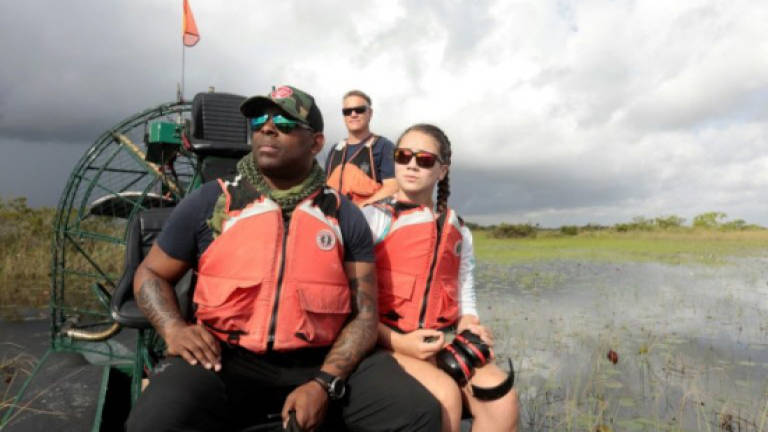War vets, inner city youth join to trap Florida pythons

BOYNTON BEACH, United States: US war veteran Chad Brown suffers from PTSD after serving in Iraq and Somalia, has been homeless and classified as mentally disabled, sold his blood for US$20 (RM85) a pop and tried to kill himself.
Now he has found some semblance of redemption in the swamps of Florida, mucking around with disadvantaged inner city youths to catch snakes and get a taste of nature as he works to connect with other people.
The project is the brain child of a Portland-based NGO called Soul River. The kids find adult mentors while the vets gain some perspective on life, says Brown, a decorated Navy veteran who founded the organization.
On this particular day Brown is with another vet and five youths in the Loxahatchee nature reserve, on Florida's east coast, when a Burmese python slithers out of a sack that a forestry official had been holding it in.
One of the kids, 14-year-old Gabriel Bliss, tries to trap the snake as he has been taught. But he messes up – and it bites him.
"That's the coolest thing," said Bliss, showing off his bleeding hand.
Later, the group troops off into a swamp with muck up to their hips infested with mosquitos and alligators. But a Florida Everglades guide assures them that the big-toothed critters do not like human flesh. All the humans get are bug bites.
Brown founded Soul River in 2011 after concluding that a simple sport – fly fishing – was the only thing that helped him battle his Ptsd.
Natural medicine
Brown left the Navy in 1994 and bottomed out in 2000 when he was admitted to a psychiatric ward and thought he had lost everything. But life changed when he ventured out into nature. He went fishing.
"When I was hooking in on my first fish, I was laughing and I was proud and I felt all this medication that I was taking was coming out of my system, basically," Brown said.
He went to tell his doctors how much it helped. Their answer: keep doing it.
"I started to fish more, and fly fishing became a very, very critical lifestyle pivot piece of my life. It was like a medicine for me," the 45-year-old Texan said.
In 2011, Brown decided to share this unexpected kind of therapy with underprivileged youths in Portland, where he lives now, and with fellow war vets.
"We give them an opportunity to find themselves as I found myself on the river," he said.
Such is the case of young Bliss, who decided to take on herpetology – the study of reptiles and amphibians – after his snake bite.
And then there is Tyrell Hall, 16, who used to dream of being a football player but now wants to study birds and become an ornithologist.
But these kids find mentors in other ways, too. Eighteen year-old Citlalli Briseno said that she has never met her father.
"There was a lot of anger and resentment towards him and just being in this organization, seeing men that actually have families, that actually care for their families and being exposed to different things that I can do that are productive in my community, it's really eye-opening and it helps out a lot," said Briseno.
In 2013 the US Fish and Wildlife Service began providing subsidies for Soul River, which has altogether taken some 300 young people and vets on expeditions in Oregon, Alaska and now Florida.
Brown worries about the effect President Donald Trump's proposed deep budget cuts would have on his program.
Money is tight
Trump's proposed 2018 budget for the Fish and Wildlife Service calls for $1.3 billion in funding – a 13 percent cut compared to the previous year.
The programs that would be eliminated include Soul River.
Trump's budget proposal still needs to undergo congressional review and debate, but budget cuts even this year are hurting Soul River.
The Fish and Wildlife Service in Alaska promised half of what it gave in 2016, said Brown.
"That hurt me. It hurt me a lot," said Brown. He starts crying and fails to finish his sentence.
Kristen Gilbert, a Fish and Wildlife official involved in the Alaska trips, said she is sorry about the funding cuts.
"I think what Chad does, particularly with veterans and youth, is really interesting because he comes at a different angle than just the recreation aspect," Gilbert said.
She especially praised the "healing and nature aspect" of Soul River.
To compensate, Brown is seeking private donations and corporate sponsorships.
Brown made the Everglades trip with financing from a fishing tackle company, and plans to take another group to the Arctic this year. But the overall number of trips is down to half of what it was in 2016.
Brown said this is a personal beef because Trump made better treatment of war vets one of his main campaign promises.
"It's very disappointing," he said. — AFP